
In the year 2022, a good 50 years into the Information Age, companies need software developers more than ever.
You will be hard-pressed to find a business not associated with technology, as the modern world relies so heavily on the digital space.
The reliance on tech workers has made developers an invaluable, irreplaceable part of the workforce.
This has given rise to various new workplace trends, from remote work to a focus on soft skills in hiring.
In this article, we’ll guide you through six current hiring trends you should be aware of.
Table of Contents
Remote hiring is becoming more popular
In today’s post-Covid world, it’s difficult to find someone who hasn’t worked remotely.
The pandemic has brought about unprecedented changes in workplace culture, inciting an almost global ‘work from home’ revolution.
Software developers, however, go slightly against the grain—they didn’t have to wait for a global pandemic to be able to work from home.
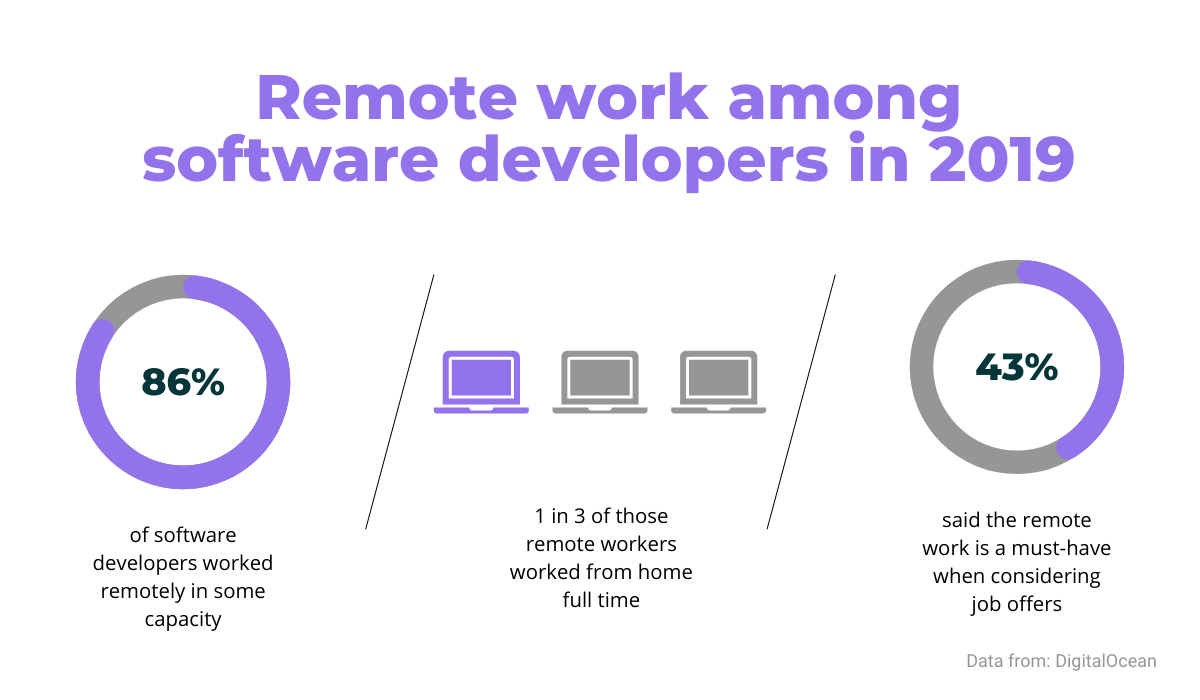
The home office was not a foreign concept for tech workers way back in 2019, and the aftershocks of COVID-19 have only further popularized remote work.
In fact, from 2018 to 2021, remote work statistics have quadrupled.
Hiring developers remotely is becoming the norm, as you can see in the graph below, which shows job postings on Hacker News, a website frequented by programmers.
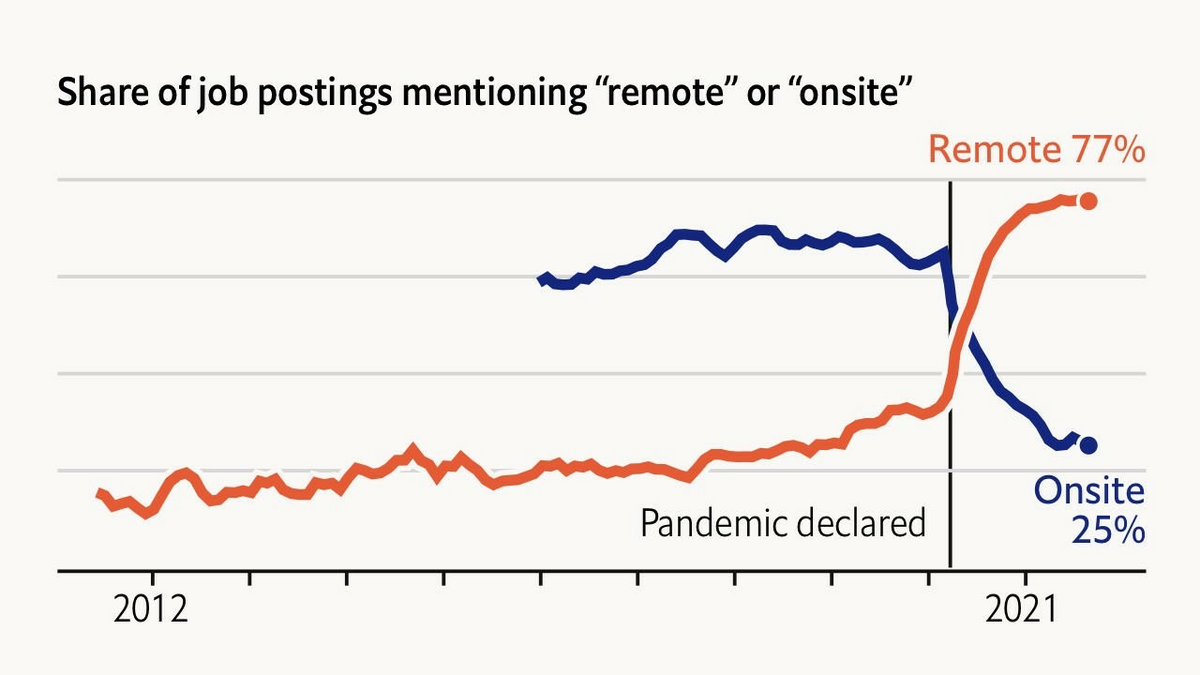
So, why is remote work so normalized amongst software developers? There are multiple reasons, and benefits for both employee and employer.
Let’s take a closer look at some of them.
Benefits for them, your employees
The jury is out—working remotely does wonders for your work-life balance.
Developers say their quality of life has improved since they’ve been able to work from home, citing perks such as no commuting, having more time to run errands, and quality time with their loved ones.
Chris Hughes, one of Aquia’s co-founders, is one such advocate of remote work.
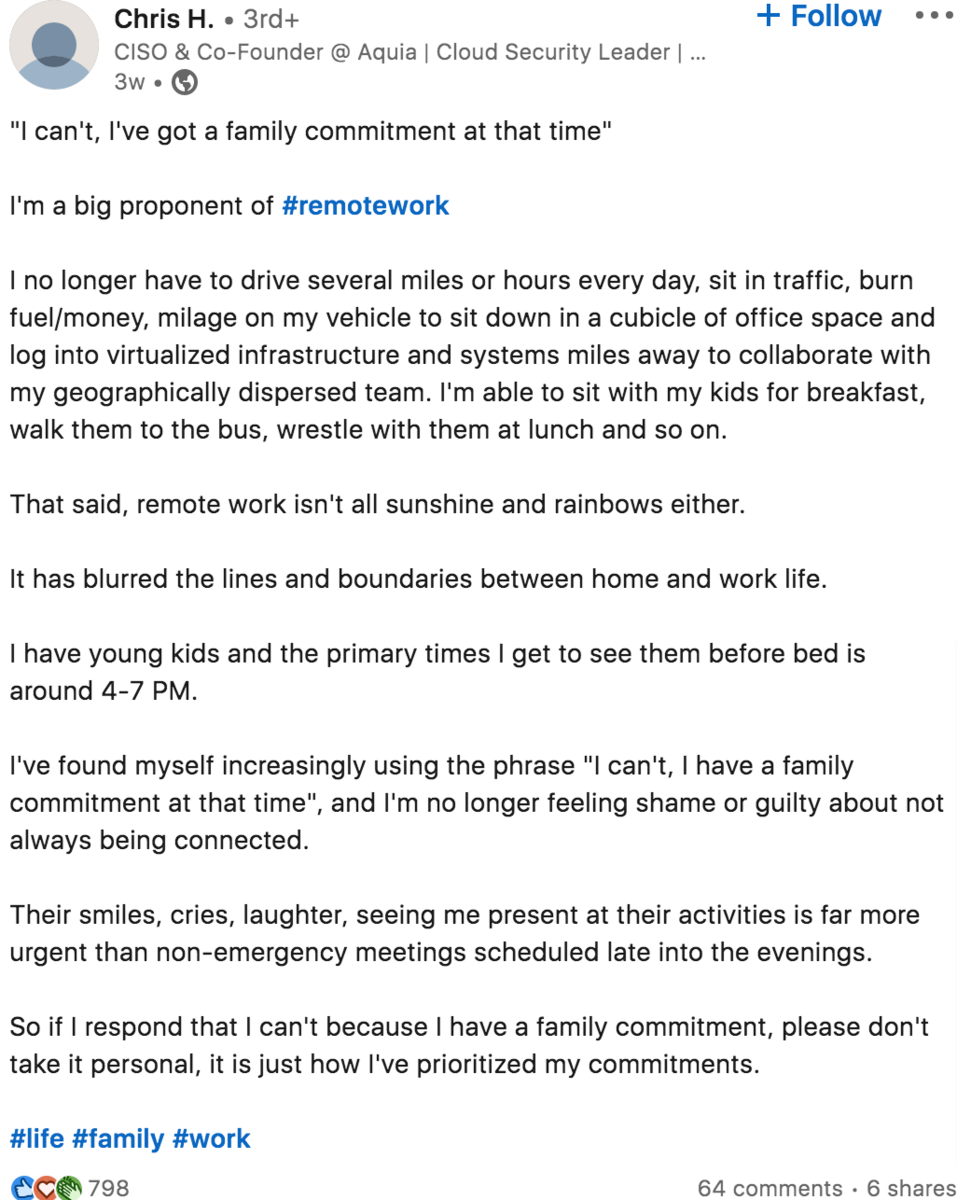
Aside from the flexibility, remote work also offers a variety of financial advantages. For instance, you’re not subject to the local currency or limited to your location’s salary level.
This opens up opportunities to make more than is average for your region and gives your finances a turbo-powered push.
Benefits for you, the employer
While the employee has the opportunity to earn above-average for their area, the employer is most likely saving costs by allowing them to work from home—it’s a win-win situation.
Remote work eliminates the need of paying for office space and supplies, resulting in lower overhead costs.
Research shows that allowing employees to work from home even 50% of the time would result in, on average, $11,000 saved per employee.

Get unreal data to fix real issues in your app & web.
Another considerable benefit is around-the-clock availability. In a world where even some pre-schoolers have smartphones, users expect constant service.
With a remote, global team of developers, it’s possible to constantly have someone on deck.
This keeps end-users happy without forcing your team to work the graveyard shift—simply coordinate your time zones!
The salaries for software developers are still rising
Salaries for software developers have been on an upward trajectory since the beginning of the decade, and are showing absolutely no signs of slowing down.
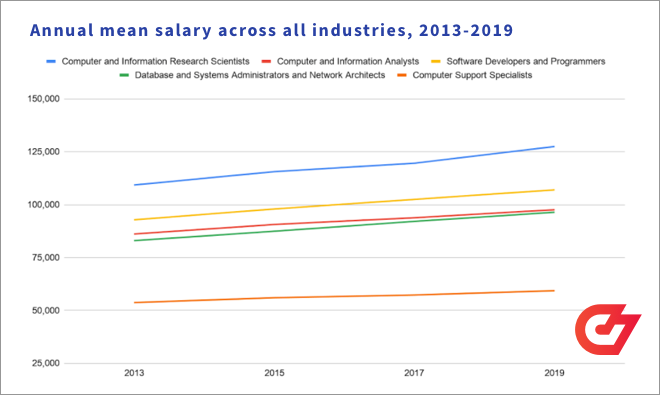
The steady incline has been ongoing since 2013 and in some cases has now reached heights of above 100,000 USD.
If we compare salaries across other professions, the average wage outside of the tech world has increased by 34% since 2000.
In contrast, we are looking at a whopping 131% rise in the average software developer’s paycheck. Why do developer salaries continue to skyrocket?
The principal reason for this growth is textbook supply and demand, fueled by a worldwide shortage of software developers.
The backbone of most 21st-century businesses is technology, and competent IT workers can make or break an organization.
However, there simply aren’t enough professionals to fill the global demand.
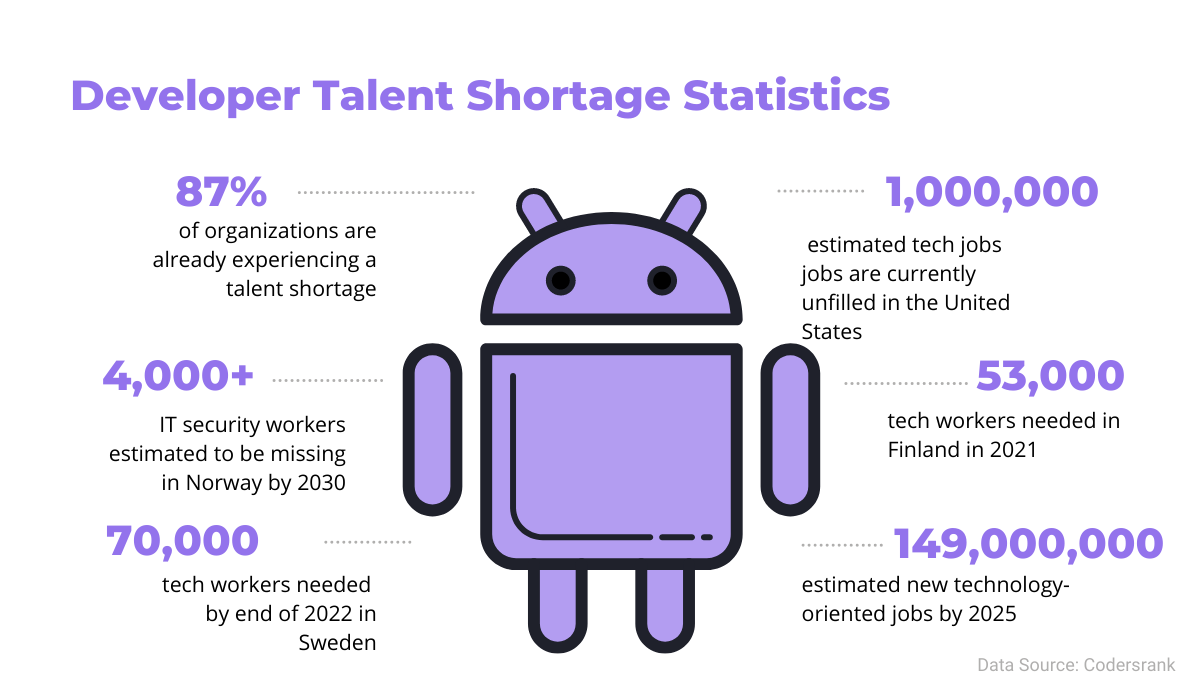
Given these astronomical numbers, companies place high value on a good software developer and compensate accordingly.
Therefore, given that developers can command high salaries at almost any company, recruiters have had to adapt their hiring strategies to attract workers.
To begin with, many are shortening their hiring cycle. Speed is a considerable advantage when hiring—you simply get to the candidate before others do.
Research shows that, nowadays, companies in the U.S. take thirty days to hire a new developer, whereas those in the U.K. need 34 days.
This is a decrease of 25% when compared to the previous year. As you can see, employers are trying to act quickly, and candidates are sure to appreciate this.
An anonymous user in the screenshot below gave an overarchingly positive Glassdoor review to a company that wasted no time in giving them an offer.
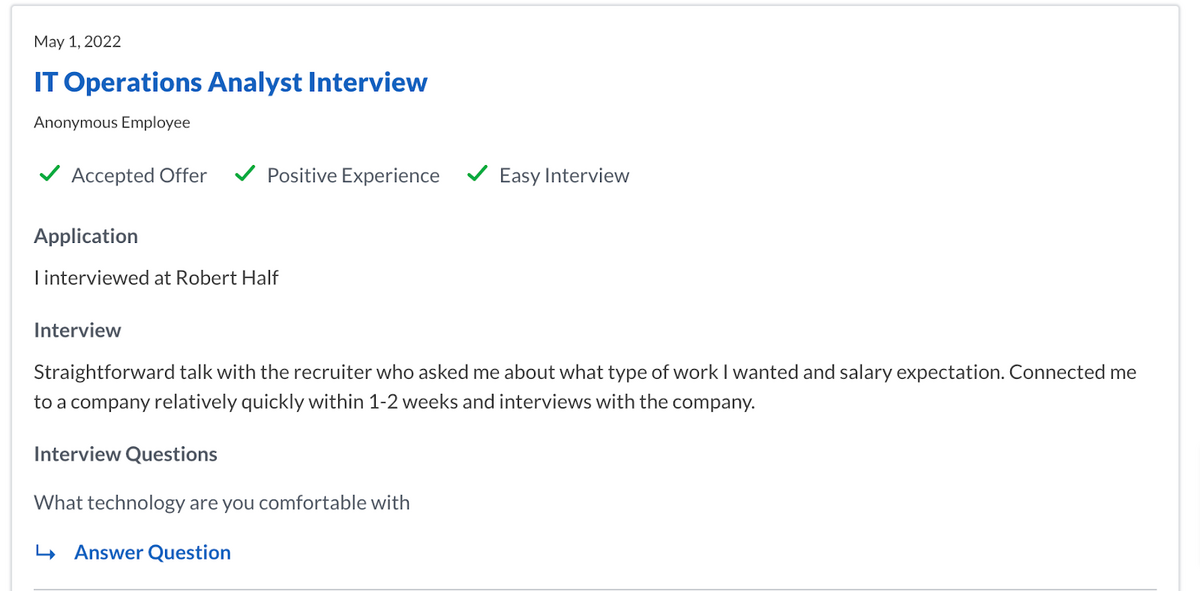
Along with this, companies are broadening their search criteria.
Although it can be tempting to advertise a point-by-point list of your required skillset, you are significantly narrowing your candidate pool by doing so.
Furthermore, if you find a fit for the role, they can then command a higher salary because of their niche expertise.
It is probably then more fruitful to focus on some fundamental skills and then invest in upskilling the new hire.
Finally, outsourcing is also becoming an attractive option. As worldwide freelancers surpass an incredible 1 billion, companies are turning to freelance software developers for tech work.
Drew Dorgan, owner of GlobalHMA and Workhorse Development, is just one use case.
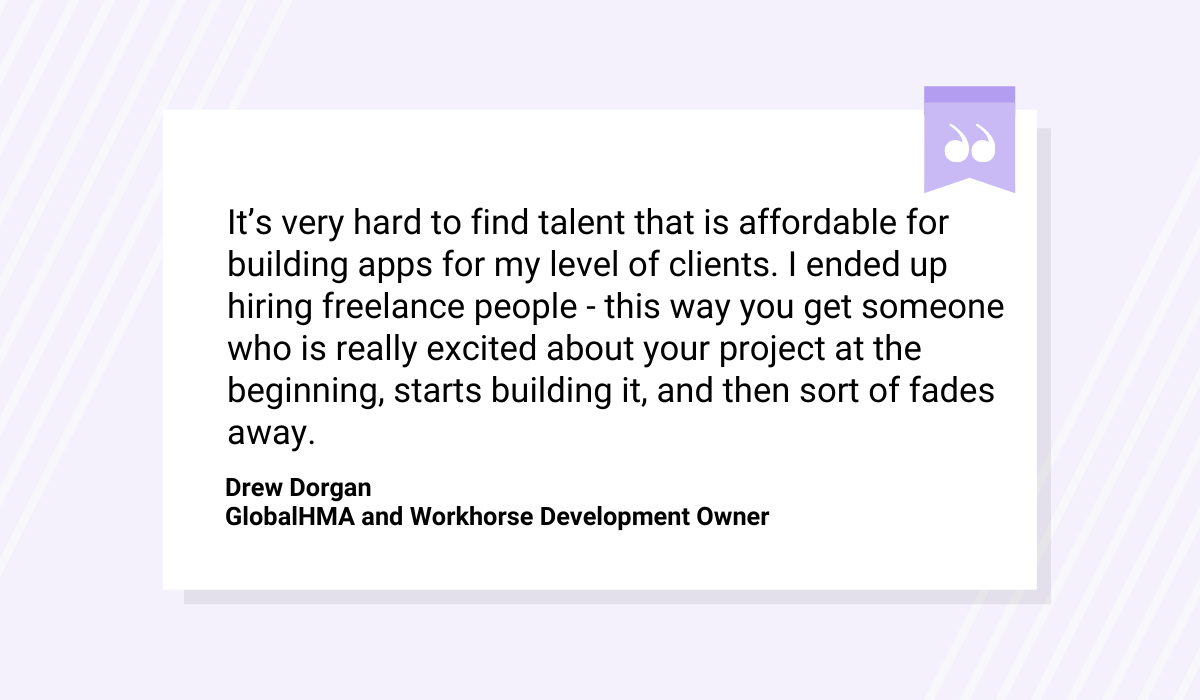
This is an excellent solution for any business that requires assistance from developers on short-term projects, seeing as you only pay them for that one project, without having any obligations towards them beyond that.
Employers are attracting talent with extra perks
With the workplace market as competitive as it is, another method of attracting new hires is offering extra benefits.
Although your offer of salary might not match that of Big Tech businesses, you can make yourself competitive by attracting candidates with additional perks.
Below are the most common non-financial benefits offered by startups.
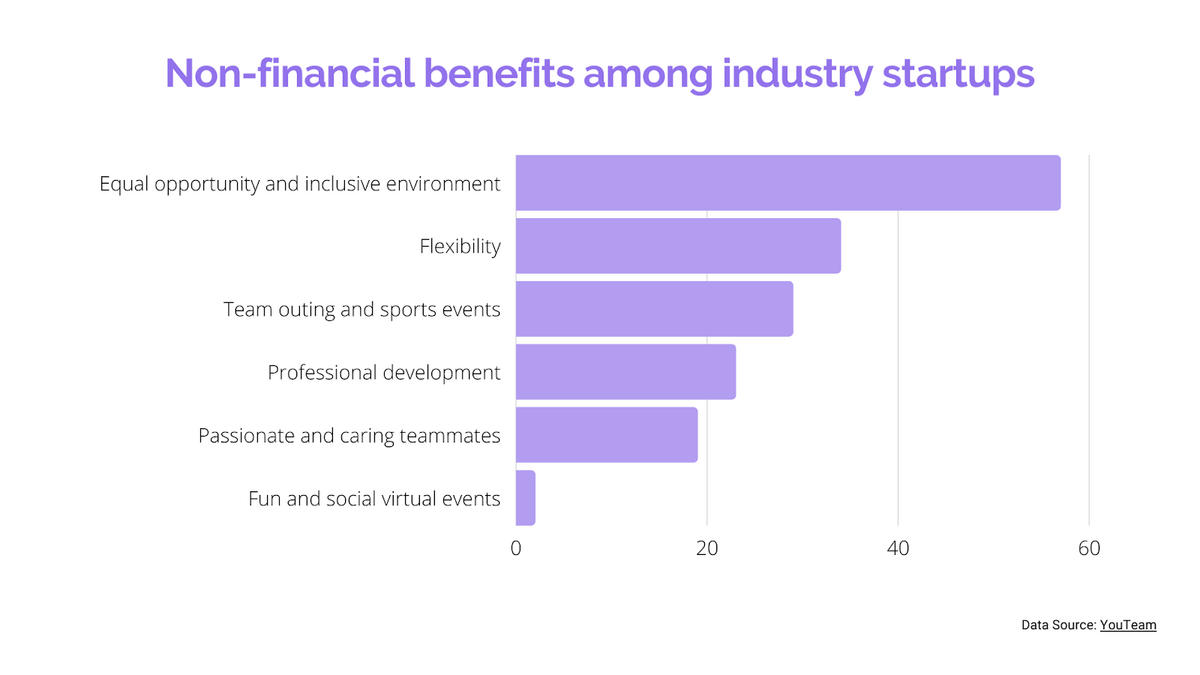
Working in an inclusive environment (57%) and having the same opportunities and resources as others is perhaps an understated benefit that many take for granted.
A quick look at the numbers shows the real picture: the global software developer workforce consists of only 27.5% women.
The remaining 72.5% of developers are male.
Being reassured right at the outset that every employee is supported and accepted regardless of gender, race, etc., means a lot to underrepresented demographics.
By striving to build such a workplace culture, you might win over candidates who would have otherwise chosen a higher salary.
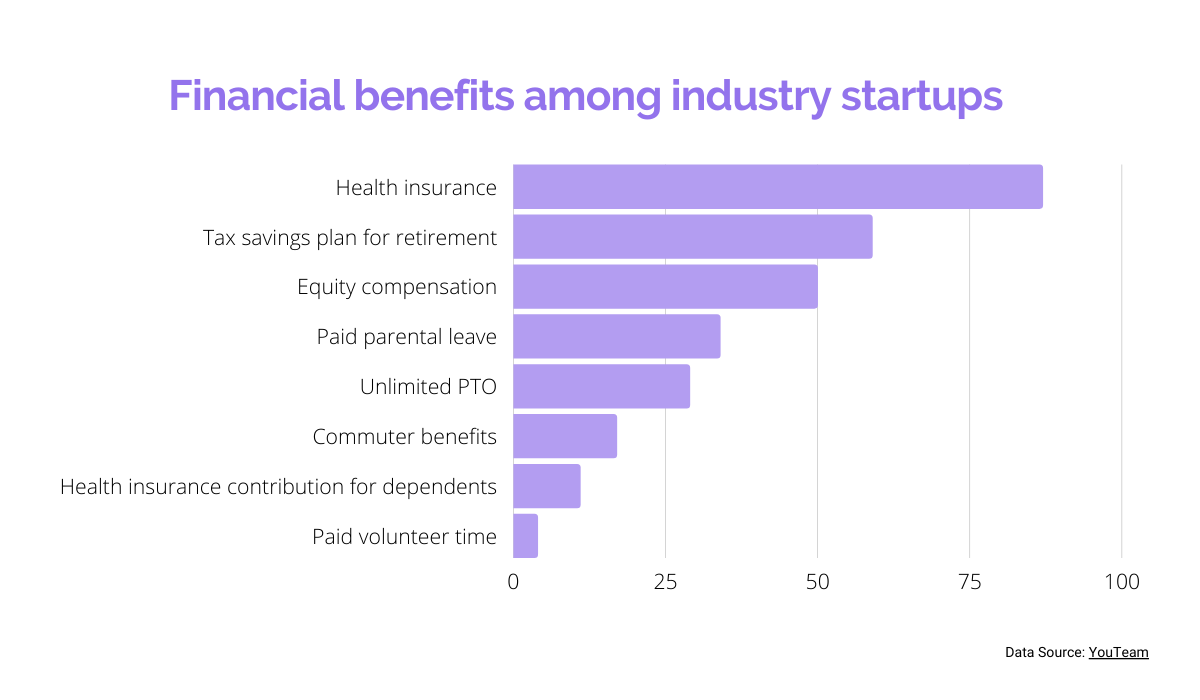
When examining monetary perks, the winner is health insurance at 87%.
This shouldn’t be a surprise, as providing access to medical services will keep your employees happy and healthy—and working.
In fact, offering healthcare insurance will increase not only employee satisfaction but also their productivity.
Tax savings plans and paid parental leave are also notable mentions.
If you are targeting a specific age group, particularly millennials and older Gen Z’ers, it is worth considering adding these benefits to your offer.
Parents will appreciate it and including them should immediately look appealing in a job ad.
Last are the various fun perks you could offer. Free lunches and culinary benefits lead at 28% and 27%, respectively, followed by wellness perks.
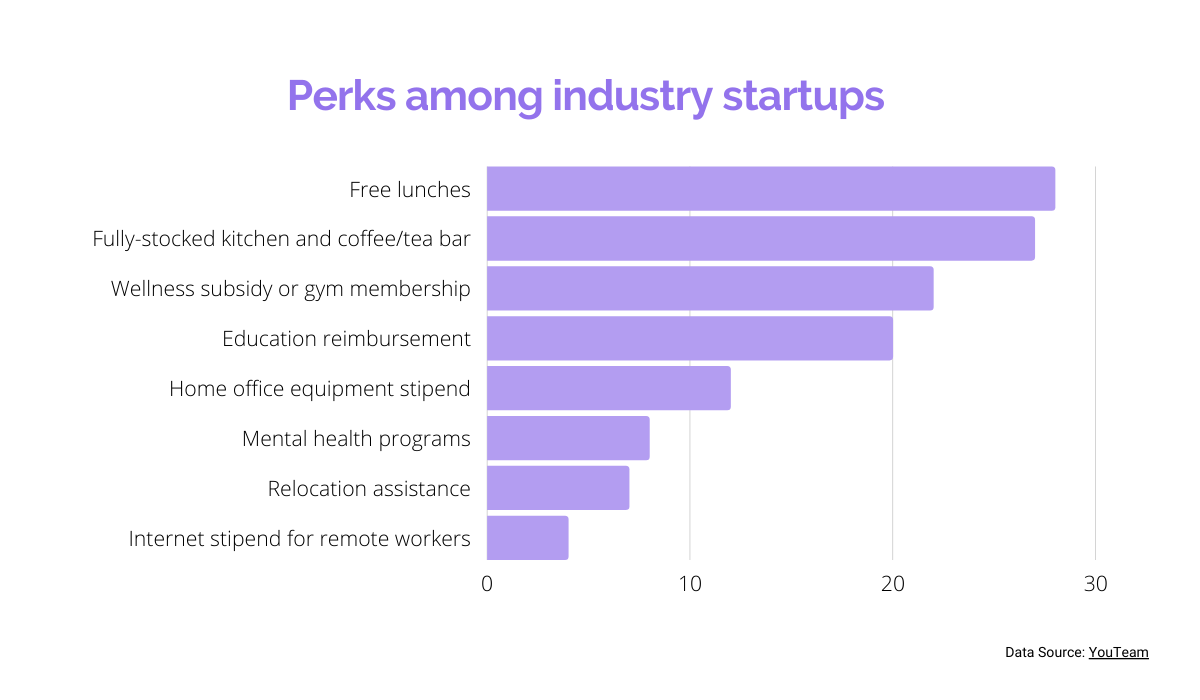
These are great incentives.
You don’t need to spend long on Google to find articles like “easy and healthy lunches for work”, so not worrying about cooking is an underrated benefit many employees will appreciate.
After all, being able to rely on their employer for a mid-day meal saves them the most valuable resource of all—time.
Education reimbursement is another eye-catcher, as are opportunities for professional growth in general.
Just as paid parental leave is vital for a more mature demographic, education reimbursement will surely attract the younger generations.
If that’s who you’re targeting, think about including tuition reimbursement programs.
Hiring for soft skills is on the rise
It might sound like a contradiction at first—hiring software developers for their soft skills? Still, it’s not a drill.
Employers are paying more and more attention to soft skills when hiring tech workers. The reason is simple—teamwork.

What is a team? This is the question Google tried to answer with their Project Aristotle when researching what characteristics made up a fantastic team.
Among other findings, it was established, astonishingly, that the most productive and crucial innovations came from B-teams—employees who are one rug below on the corporate ladder.
The project proved that Google’s top teams aren’t necessarily the smartest. Instead, the key to success was their soft skills.
Traits such as compassion, communication, open-mindedness, and adaptability were all hailed as the secret to running a successful team.
The old adage goes that no man is an island—and this is worth bearing in mind while hiring.
There are very few jobs that do not require cooperation, and if your company is past the startup stage, your new employee will probably work in a team.
Knowing Kotlin is impressive, but how beneficial is it if the applicant cannot get their ideas across to the Marketing team?
And Google is not the only company to realize the importance of harmonious interactions with others.
Toptal, a tech talent network of freelancers, emphasizes soft skills in their interview process, as Christy Schumann attests to below.
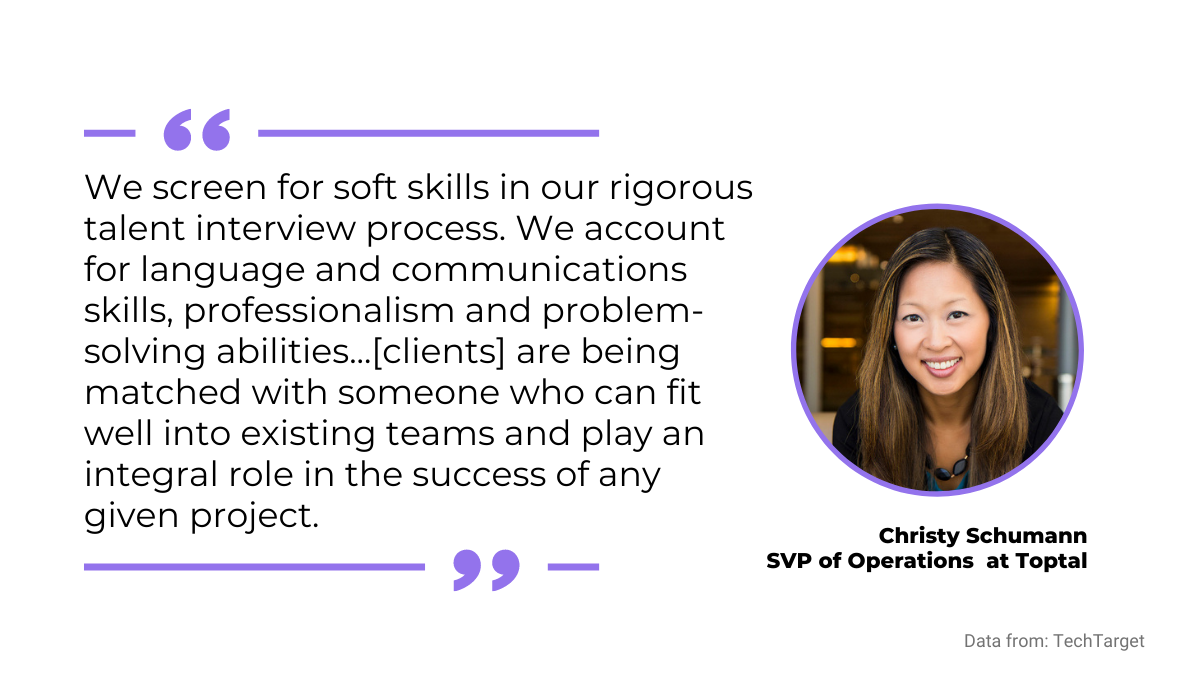
That being said, how exactly can you test soft skills in the hiring process?
Checking competence in Swift is relatively straightforward, but how do you test a candidate’s communication or time management?
Luckily, there are a few tools to assist with this.
Koru has candidates select statements most relevant to themselves, after which seven key soft skills are scored objectively. Example sentences are shown below.
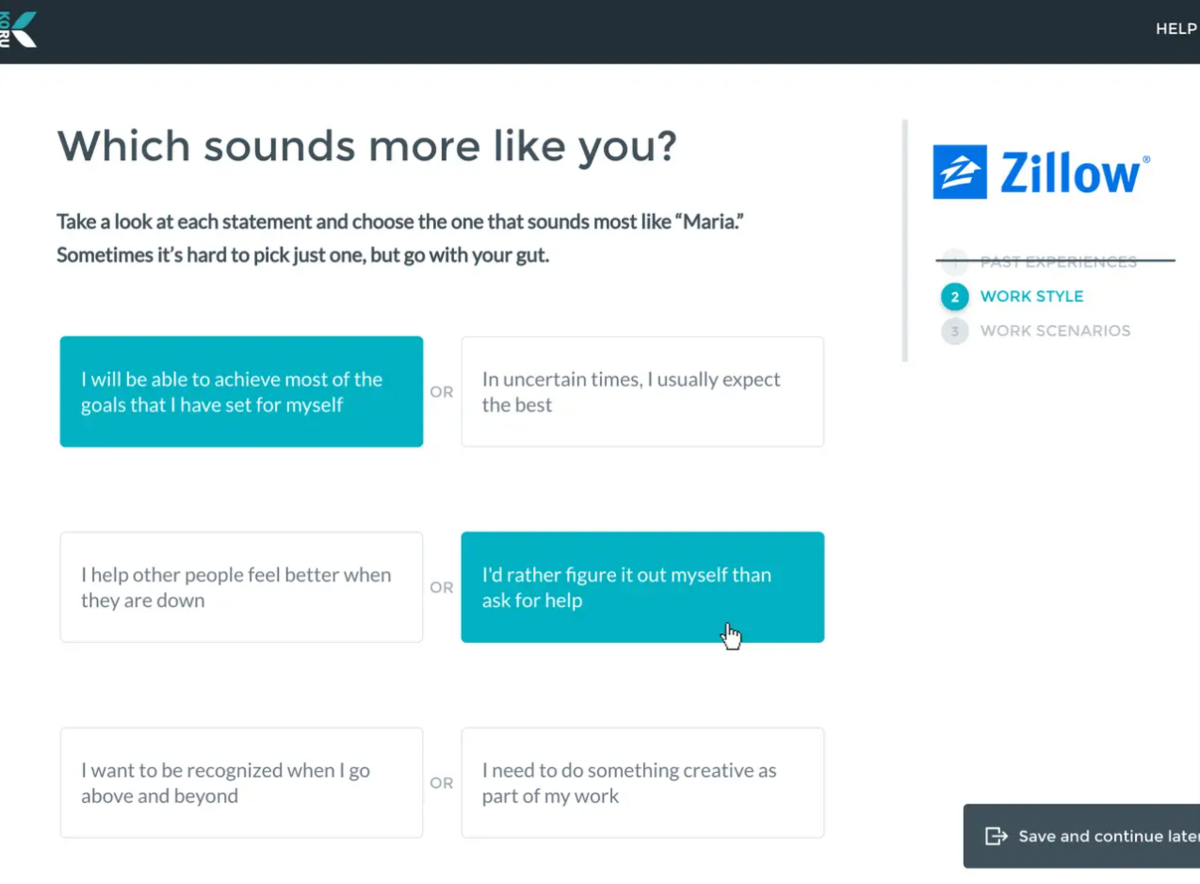
Pymetrics is another interesting tool—they utilize games to assess the level of soft skills test-takers possess.

Both tools might assist you with determining the prowess of your candidates in this area next time you’re hiring.
Different types of hard skills are becoming prominent
Besides the novelty of hiring for soft skills, there have also been new developments in the kind of hard skills that are in demand.
More and more niche programming languages are becoming popular, as employers are intent on securing the best fit for their particular business needs.
For example, newborn languages such as React.JS, RUST, and Go are rising in popularity.
The demand for RUST alone has risen by 63%, and Go was the language 32% of developers would like to learn (surpassing Python at 24%), according to the 2020 HackerEarth survey.
However, these languages are still new, and there are nowhere near as many developers who know them as there are those who command any of the ‘classic’ languages.
Java, Python, and C are, after all, still seen as must-haves.
A quick search on indeed.com shows us the numbers. Searches for software developer jobs with the RUST keywords come to 3,499.
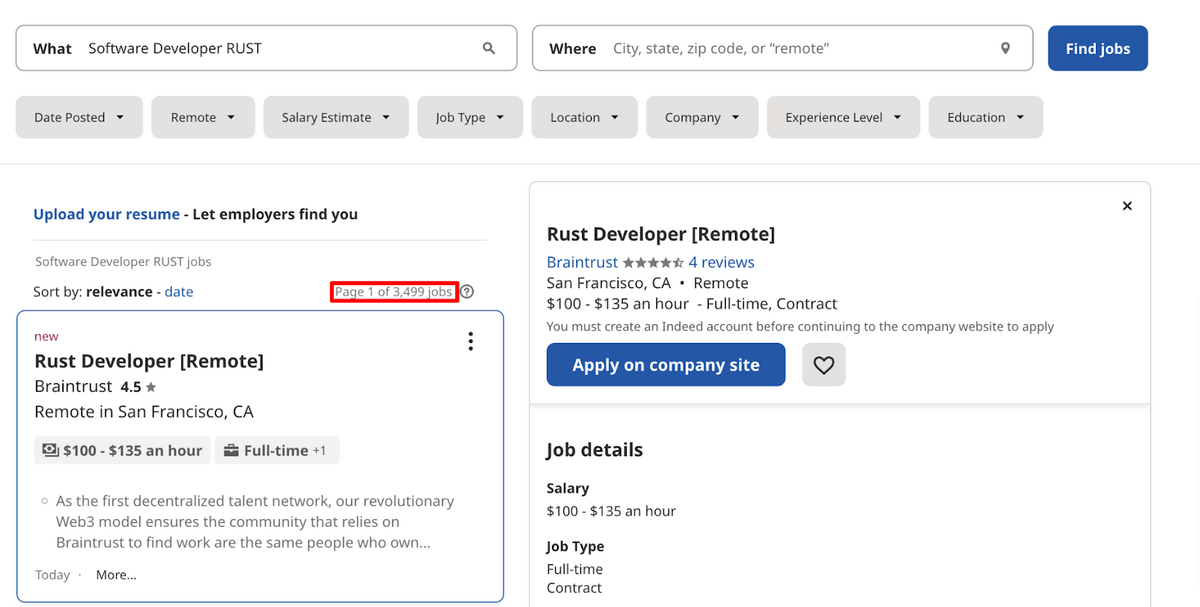
On the other hand, when looking at the number of available jobs by developer skill, Java boasts six-figure job listings, while G, predictably, ranks penultimate.
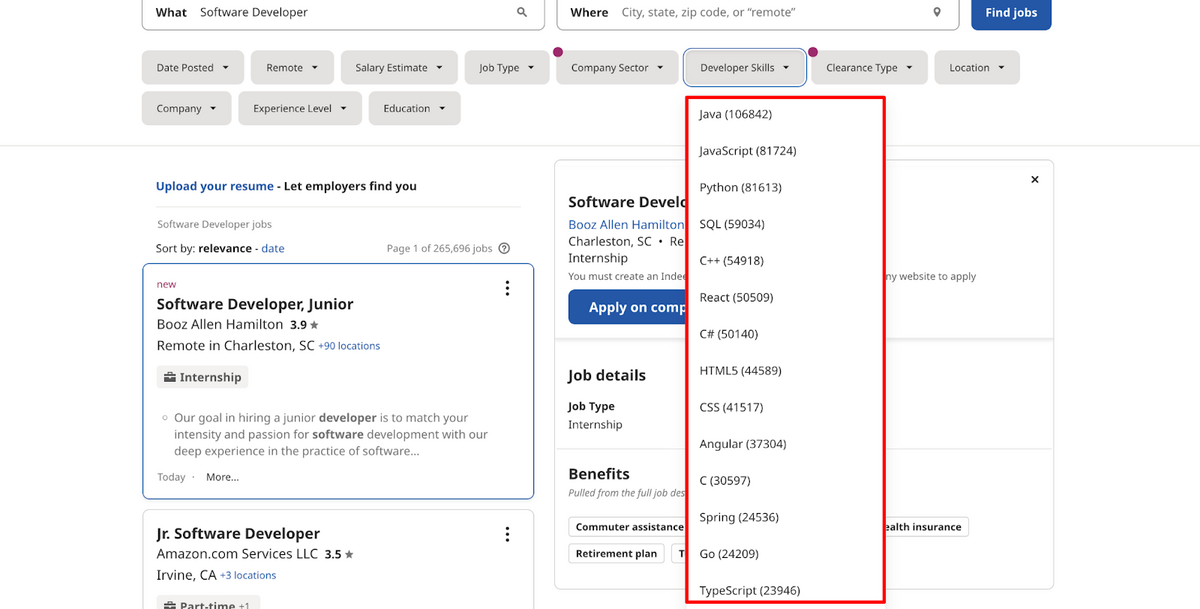
The demand for these novel languages is rising, yet is still nowhere near the levels of the classic programming languages.
Consequently, when a job ad for a niche language does crop up, there are not as many qualified developers as there are for Python, Java, etc.
A listing for a Python engineer will probably attract dozens of applicants, with the language being so widespread. RUST, Go, Kotlin, Ruby, etc. are different stories.
There is simply a much smaller talent pool.
As a result, those few candidates who do have expertise in emerging languages can demand bigger salaries, simply because they are in such short supply. Take a look at the graph below:
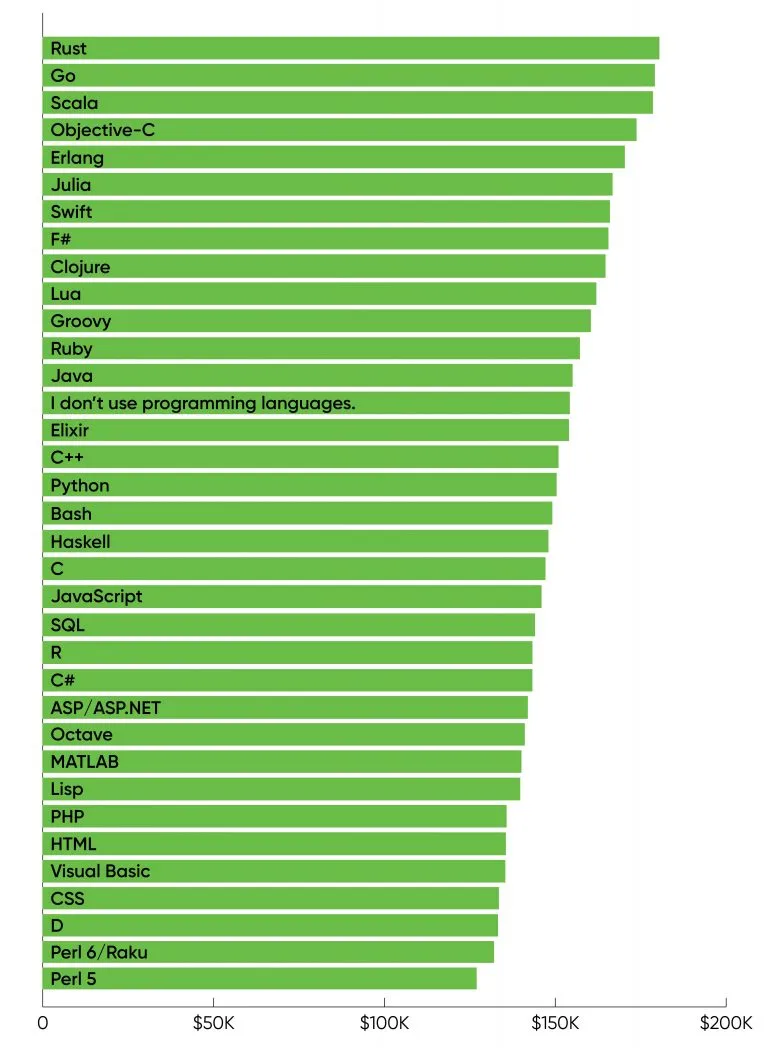
Taken from the 2021 Data/AI Salary Survey, it is evident that the highest figures are for these niche languages.
Again, this is simply because there are fewer developers for these languages, and thus they are often more valued by employers.
As Frederic Desmoulins, co-founder and CEO of Codin Game puts it:
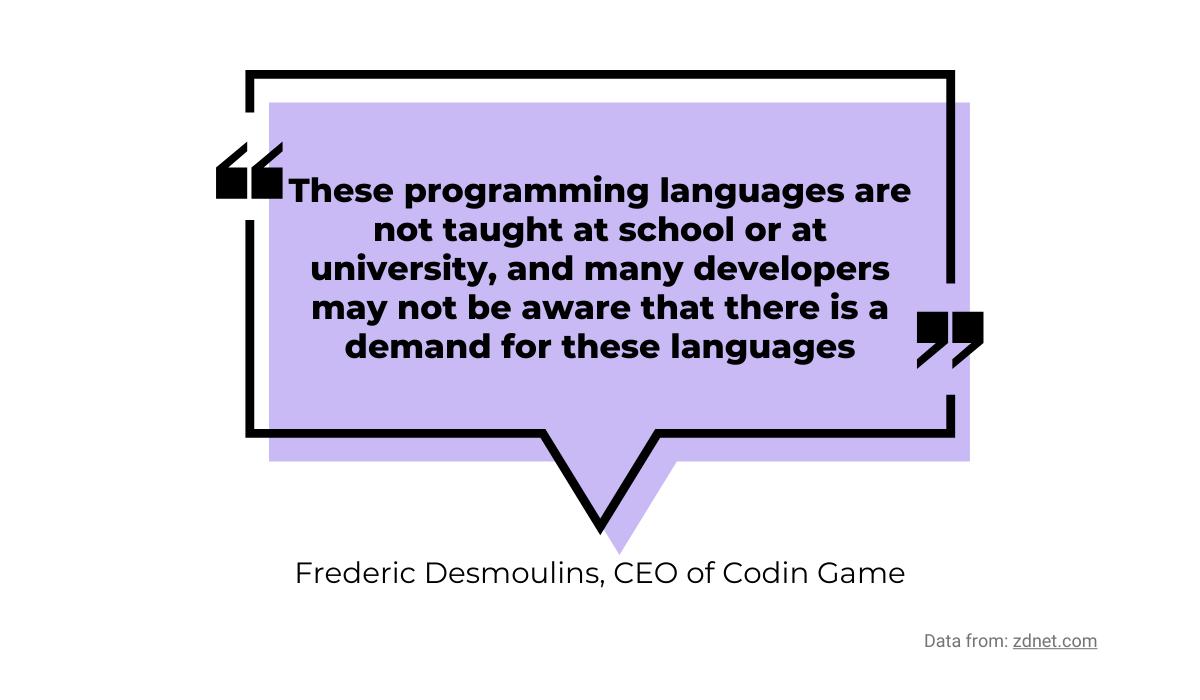
However, there is indeed a demand, and the future will likely only see growth for these new, non-traditional languages, so it is worth keeping tabs on the latest language trends,
Company culture is starting to matter the most
In a world over-saturated with developer roles and under-saturated with developers, job seekers with almost-guaranteed job security are starting to look at more than salary numbers.
Applicants are broadening their perspectives, staying mindful of their personal mindset and values, and hoping to find a company that matches their thinking.
In other words, they are starting to prioritize company culture.
The Randstad Employer Branding Research Report found that 64% of European workers viewed a pleasant work atmosphere as the main reason to choose an employer, placing company culture on a high pedestal.
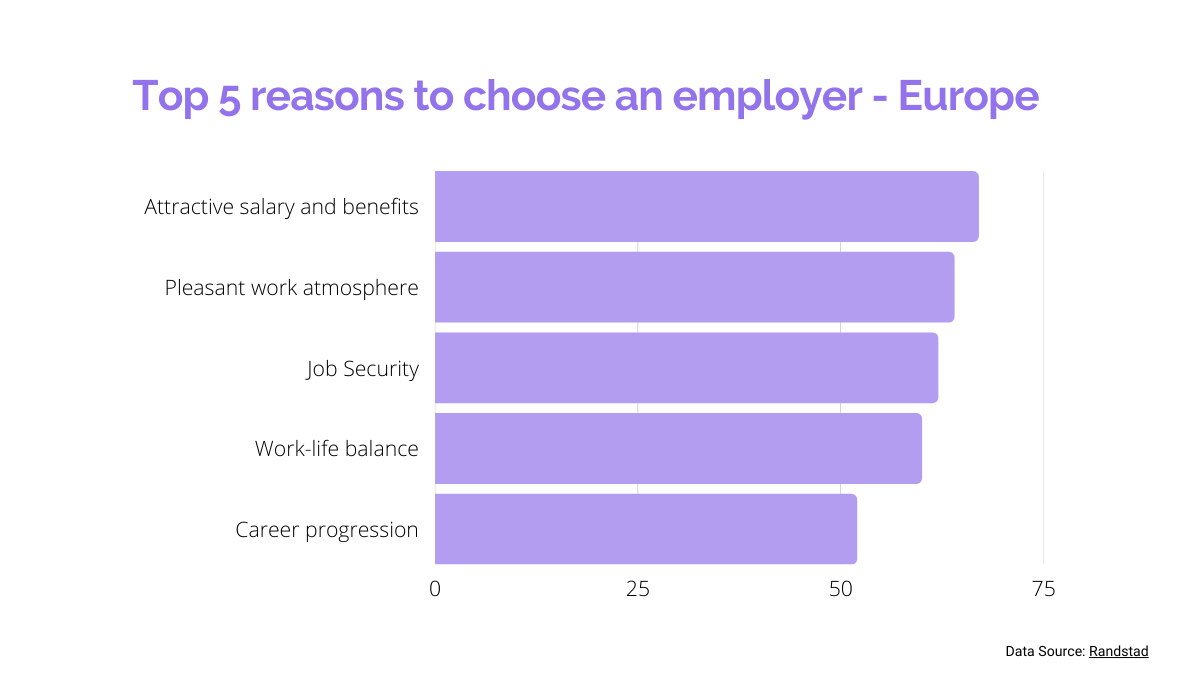
A pleasant work atmosphere is placed even above work-life balance (60%).
This can indicate that if a company can align with an employee’s principles and morals, work may not even feel like work.
Hireology is a fantastic example of a company with a well-developed company culture.
The software provider has a fair share of remote employees and takes several measures to ensure they feel a part of the organization.
This includes video call equipment in every meeting room, training for remote work, and even a bi-yearly meet-up for all employees—even those working remotely.
Ensuring your remote employees have all the resources they need goes a long way towards making them feel valued, and lets applicants know that their contribution to the company is appreciated and that they’re more than just a number.
Hireology also prioritizes understanding and collaboration between employees and even hosts empathy exercises where workers swap jobs, therefore helping them empathize with the other’s position (and problems that go with it).
These values are clearly outlined on their careers page, where the company confidently (and comically) forbids any, as they put it, “assholes”, whilst favoring psychological optimism.
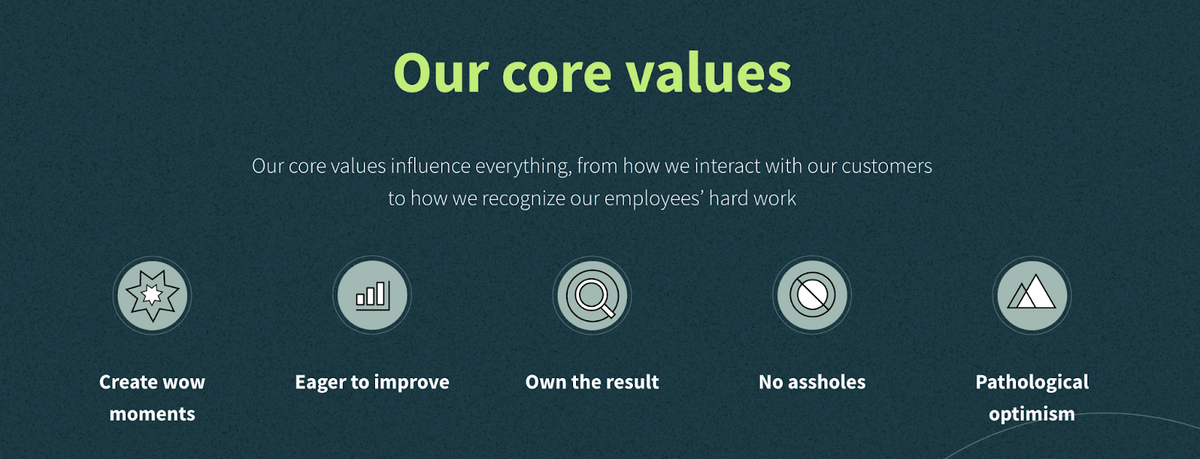
Having such a bold message on the one page potential applicants are sure to visit sends a powerful message, as it lets visitors know right away how strongly the business values collaboration and a positive environment.
Such outspokenness is sure to attract possible hires.
There is even a video explaining the benefits and perks of working at the firm.
In it, the company culture really gets to shine, as potential employees get to see real people talk about what work there consists of.
Conclusion
The tech environment has evolved: from a workforce preoccupied with hard skills to one that values soft ones.
Added to this is a newfound respect for company culture, and businesses are realizing the value of benefits.
Remote work is also widespread, as are niche programming languages like Ruby and Go. Topping it all off are the ever-rising salary rates.
In this article, we’ve tried to present these current recruitment trends and give you an idea of what the hiring process looks like today.
We hope it helps you hire the best talents for your company!




